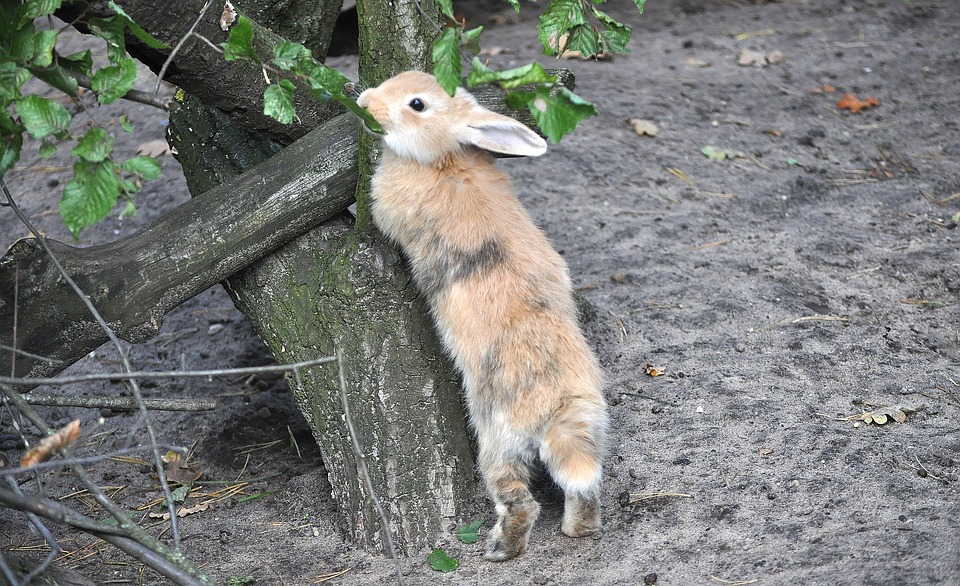This guide will equip you with the knowledge and practical strategies to protect your garden from the persistent nibbling of rabbits. From understanding their behaviour and identifying damage to implementing a multi-pronged approach, we'll cover every aspect of rabbit-proofing your green space.
Part 1: Understanding the Rabbit

1.1 Rabbit Behaviour
Rabbits are natural herbivores, making your garden a tempting buffet. They're mainly active at dawn and dusk (crepuscular) but can be active during the day, especially if food is scarce. Their behaviour often reveals their presence:
- Nibbled foliage and plants: Leaves, flowers, and even bark show signs of their distinct gnawing style.
- Excavated areas around plants: Rabbits dig to access roots and underground vegetables, leaving characteristic holes and loose soil.
- Droppings: Small, round pellets are a common sight, usually found in sheltered spots.
1.2 Rabbit Damage
The level of damage can be significant depending on the rabbit population and the vulnerability of your plants.
- Vegetable garden devastation: Rabbits are notorious for decimating vegetables, especially leafy greens, carrots, and beans.
- Flower devastation: Petals and buds are prime targets for these herbivores, leaving your flower beds looking bare.
- Damage to trees and shrubs: Young bark and saplings are often gnawed on, causing structural damage and potential death.
- Lawns: Patches of dead grass can appear where rabbits have grazed heavily.
Part 2: Choosing the Right Deterrent

2.1 Physical Barriers: The Foundation of Protection
2.1.1 Fencing: A Sturdy First Line of Defence
Height: Rabbits are excellent jumpers, so fences need to be at least 4ft (1.2m) tall, preferably taller if you have particularly agile bunnies in your area.
Material: Chicken wire, welded wire mesh, and solid panels are the most effective materials. Avoid loosely woven mesh, as rabbits can easily push through it.
Bury the base: Digging down 6 inches (15cm) and burying the bottom of the fence prevents rabbits from burrowing underneath.
Secure installation: Ensure there are no gaps or weak points in the fencing, especially at corners and junctions.
2.1.2 Netting: Protecting Specific Areas
Fine-mesh netting: This offers a cost-effective way to protect individual plants or specific garden areas.
Secure attachment: Use stakes, hoops, or other supports to securely attach the netting and ensure it extends at least 1ft (30cm) above the plants.
2.2 Natural Deterrents: Working with Nature
2.2.1 Plant Choices: A Rabbit-Resistant Garden
Select natural deterrents: Lavender, rosemary, marigolds, garlic, and alliums are naturally unappealing to rabbits.
Companion planting: Planting rabbit-resistant species alongside vulnerable plants can create a natural barrier.
2.2.2 Scent Deterrents: Unleashing Nature's Scents
Predator urine: Commercially available predator urine (fox, coyote, or wolf) creates a scent that discourages rabbits. Apply it around the perimeter or specific plants, renewing regularly.
Strong-smelling plants: Rosemary, peppermint, and garlic have pungent scents that rabbits dislike.
2.3 Visual Deterrents: Playing with Perception
Motion-activated sprinklers: These devices detect movement and spray water, startling rabbits and deterring them from entering.
Shiny objects: Hanging reflective objects like CDs, old mirrors, or aluminum foil can confuse and frighten rabbits, making them less likely to approach.
Part 3: Home Remedies: Simple and Effective
3.1 DIY Repellents: Using What You Have
Garlic spray: Combine crushed garlic with water and spray it on plants and surrounding areas. The pungent smell acts as a deterrent.
Pepper spray: Mix hot pepper flakes with water and apply to plants. The spicy flavour and scent will discourage nibbling.
Citrus peels: Scatter orange, lemon, or grapefruit peels around the garden. The citrus scent is generally unpleasant for rabbits.
3.2 Other Home Remedies: Time-Tested Techniques
Human hair: Scattering human hair around plants, especially those that have been nibbled on, is believed to deter rabbits.
Soap flakes: Mix soap flakes with water and spray it on plants and the ground around them. The soapy scent and residue can act as a deterrent.
Eggshells: Crush eggshells and scatter them around plants. The sharp edges can be uncomfortable for rabbits to walk on.
Part 4: Advanced Solutions: Addressing Persistent Problems
4.1 Rabbit-Proofing Your Vegetable Garden
Raised beds: Creating raised beds with a sturdy barrier at the base effectively protects vegetables from digging rabbits.
Caging: Cover your vegetable garden with wire mesh or netting, extending it at least 1ft (30cm) above the plants to prevent jumping.
4.2 Wildlife Control: If Other Measures Fail
Trapping: If rabbits persist despite other efforts, humane trapping can help relocate them to a safe distance from your garden.
Professional pest control: Consult a professional for assistance with more severe rabbit infestations. They may employ a combination of trapping, exclusion, and other methods.
Part 5: Prevention is Key: Creating an Unwelcoming Environment
5.1 Keeping Food Supplies Low
Remove tempting sources: Keep your garden tidy, removing fallen fruit and vegetables that attract rabbits.
Regular mowing: Keep your lawn mowed regularly to prevent rabbits from finding shelter and grazing.
Store food properly: Store birdseed and pet food securely to prevent rabbits from accessing it.
5.2 Creating a Less Appealing Habitat
Remove clutter: Keep the garden free of debris and clutter that rabbits can hide under or use as nesting sites.
Trim bushes and shrubs: Overgrown bushes and shrubs provide excellent cover for rabbits, so trim them regularly.
Avoid attracting pests: Don't leave out pet food, bird feeders, or other food sources that might attract rabbits.
Part 6: FAQs
6.1 Are rabbits nocturnal?
While they are most active at dawn and dusk, rabbits can be active during the day, especially if they are hungry or need to find food.
6.2 What is the best way to deter rabbits from eating my plants?
A multi-layered approach is most effective. Combine physical barriers like fencing and netting with natural deterrents like predator urine and strong-smelling plants.
6.3 How do I keep rabbits out of my vegetable garden?
Use raised beds, cages, or netting to physically exclude them. Also, use rabbit-resistant plants and strong scents to further deter them.
6.4 Can I use a commercial rabbit repellent?
Yes, but choose products carefully. Read labels to ensure they are safe for plants, pets, and wildlife.
6.5 Can I use a dog to deter rabbits?
A trained and supervised dog can be effective, but not all dogs are suitable. Some may chase rabbits, causing harm.
6.6 What should I do if I find rabbit droppings in my garden?
Clear them away promptly, as it indicates their presence and encourages them to return.
Everyone is watching
-

Do Rabbits Lay Eggs? (The Surprising Truth)
OTHER TYPES OF PETSThis article will unravel the common misconception that rabbits lay eggs, exploring the fascinating world of r...
-

Can Rabbits Eat Grapes? A Guide to Safe Rabbit Treats
OTHER TYPES OF PETSThis comprehensive guide will explore the safety and suitability of grapes for rabbits, providing detailed inf...
-

What's a Group of Rabbits Called? (A Comprehensive Guide)
OTHER TYPES OF PETSThis article delves into the fascinating world of rabbits, exploring the various terms used to describe a grou...
-

Predators That Hunt Rabbits: A Guide to Natural Enemies
OTHER TYPES OF PETSI've always been fascinated by the circle of life, that delicate dance between predator and prey. Growing up ...
-

Are Rabbits Nocturnal Animals?
OTHER TYPES OF PETSThe question of whether rabbits are nocturnal animals is a fascinating one, with a surprisingly complex answer...
